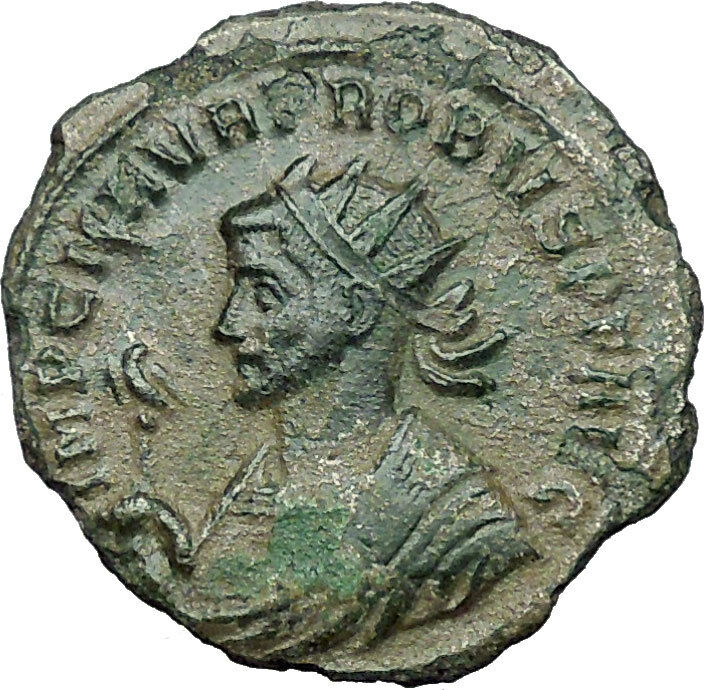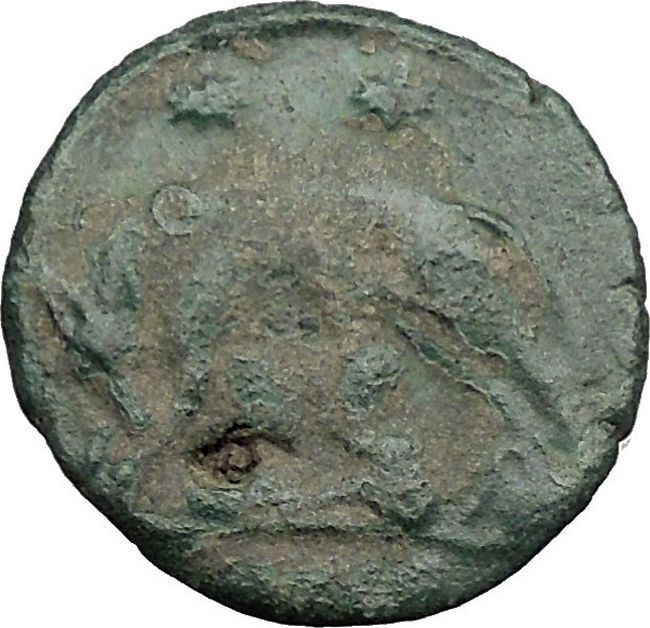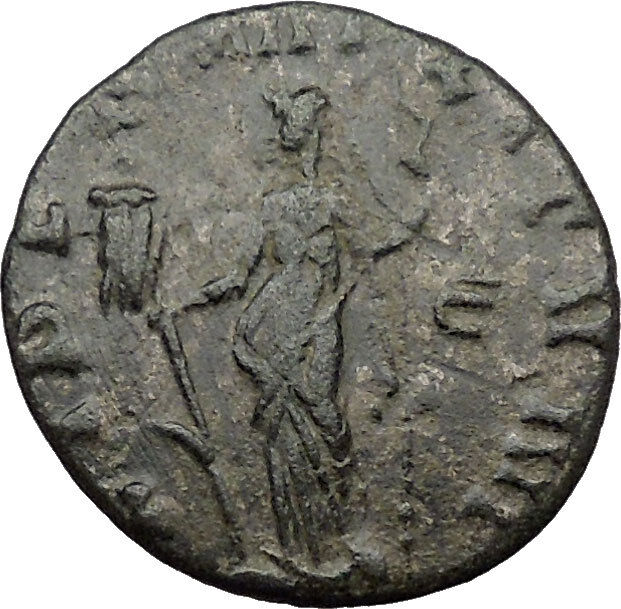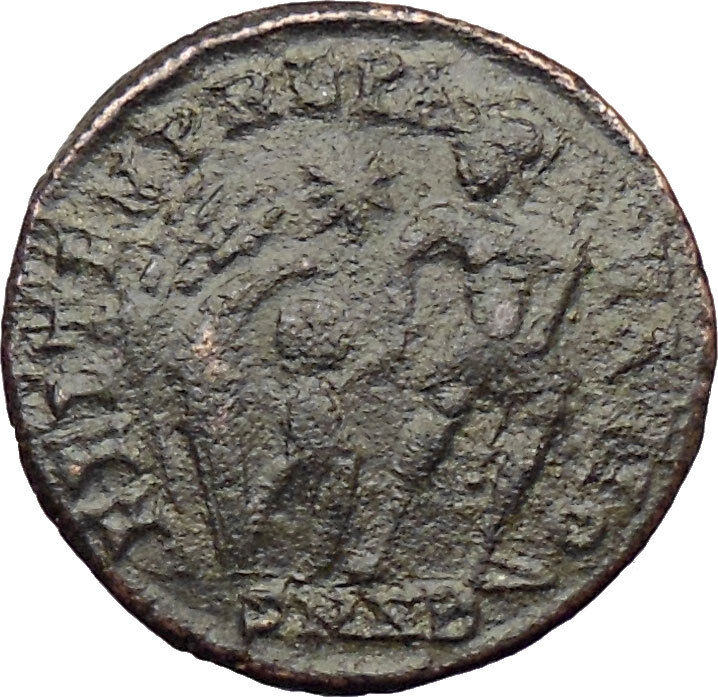|
Crispus – Roman Caesar: 317-326 A.D. –
Bronze AE3 21mm (2.42 grams) Aquileia mint: 317 A.D.
Reference: RIC 9 (Aquileia) R4 —
CRISPVSNOBCAES – Laureate, draped and cuirassed bust right.
PRINCIPIAIVVENTVTIS Exe: AQT – Crispus standing left, resting hand on shield and
holding spear.
You are bidding on the exact item pictured,
provided with a Certificate of Authenticity and Lifetime Guarantee of
Authenticity.
Flavius Julius Crispus, also known as Flavius
Claudius Crispus and Flavius Valerius Crispus was a
Caesar
of the
Roman
Empire
. He was the first-born son of
Constantine I
and
Minervina
.
Birth
Crispus’ year and place of birth are uncertain. He is
considered likely to have been born between 299 and 305, somewhere in the
Eastern Roman Empire
. His mother
Minervina
was either a
concubine
or a first wife to Constantine. Nothing else is known about
Minervina. His father served as a hostage in the court of
Eastern Roman Emperor
Diocletian
in Nicomedia
.
Thus securing the loyalty of Caesar of the
Western Roman Empire
Constantius Chlorus
, father of Constantine and grandfather of Crispus.
In 307, Constantine allied to the Italian
Augusti
, and this alliance was sealed with the marriage of Constantine to
Fausta
,
daughter of Maximian and sister of Maxentius.
The marriage of Constantine to Fausta has caused modern
historians to question the status of his relation to
Minervina
and Crispus. If Minervina was his legitimate wife, Constantine would have needed
to secure a divorce
before marrying Fausta. This would have required an official written
order signed by Constantine himself, but no such order is mentioned by
contemporary sources.
This silence in the sources has led many historians to
conclude that the relationship between Constantine and Minervina was informal
and to assume her to have been an unofficial lover. However, Minervina may have
already been dead by 307. A widowed Constantine would need no divorce order.
Neither the true nature of the relationship between
Constantine and Minervina nor the reason Crispus came under the protection of
his father will ever probably be known. The offspring of an illegitimate affair
could have caused dynastical problems and would likely be dismissed, but Crispus
was raised by his father in
Gaul. This can be
seen as evidence of a loving and public relationship between Constantine and
Minervina which gave him a reason to protect her son.
The story of Minervina is quite similar to that of
Constantine’s mother
Helena
. Constantine’s father later had to divorce her for political reasons,
specifically, to marry
Flavia Maximiana Theodora
, the daughter of
Maximian
,
in order to secure his alliance with his new father-in-law. Constantine in turn
may have had to put aside Minervina in order to secure an alliance with the same
man. Constantius
did not however dismiss
Constantine
as his son, and perhaps Constantine chose to follow the example
of his father.
Education
Whatever the reason, Constantine kept Crispus at his side.
Surviving sources are unanimous in declaring him a loving, trusting and
protective father to his first son. Constantine even entrusted his education to
Lactantius
,
among the most important
Christian
teachers
of
that time, who probably started teaching Crispus before 317.
Career
By 317, there were two remaining Augusti in control of the
Roman Empire. Constantine reigned as an
Western Roman Emperor
and his brother-in-law
Licinius
as
an
Eastern Roman Emperor
.
On
1 March
317, the two co-reigning Augusti jointly proclaimed three new Caesars. Crispus
alongside his younger half-brother
Constantine II
and his first cousin
Licinius
iunior
. Constantine II was the older son of Fausta but was probably about a
month old at the time of his proclamation. Thus only Crispus assumed actual
duties.
Constantine apparently believed in the abilities of his son
and appointed Crispus as Commander of Gaul. The new Caesar soon held residence
in Augusta Treverorum (modern
Trier
), regional
capital of Germania
.
In January 322, Crispus was married to a young woman called
Helena. Helena bore him a son in October, 322. There is no surviving account of
the name or later fate of the son.
Eusebius of Caesarea
reported that Constantine was proud of his son and very
pleased to become a grandfather.
Crispus was leader in victorious military operations against
the Franks
and
the Alamanni
in 318, 320 and 323. Thus he secured the continued Roman presence in the areas
of Gaul and Germania. Crispus joined his father in visiting Rome during 322, and
received the warmest and most enthusiastic welcome by the crowds. The soldiers
adored him thanks to his strategic abilities and the victories to which he had
led the Roman legions
.
Crispus spent the following years assisting Constantine in
the war against by then hostile Licinius. In 324, Constantine appointed Crispus
as the commander of his fleet which left the port of
Piraeus
to
confront the rival fleet of Licinius. The subsequent
Battle of Hellespont
was fought in at the straits of
Bosporus
. The 200 ships under the command of Crispus managed to utterly beat
the enemy forces which were at least double in number. Thus Crispus achieved his
most important and difficult victory which further established his reputation as
a brilliant soldier and general.
Following his navy activities, Crispus was assigned part of
the legions loyal to his father. The other part was commanded by Constantine
himself. Crispus led the legions assigned to him in another victorious
battle outside Chrysopolis
against the armies of Licinius.
The two victories were his contribution to the final triumph
of his father over Licinius. Constantine was the only Augustus left in the
Empire. He honoured his son for his support and success by depicting his face in
imperial coins, statues, mosaics, cameos, etc. Eusebius of Caesaria wrote for
Crispus that he is “an
Imperator
most dear to God
and
in all regards comparable to his father.”
Crispus was the most likely choice for an heir to the throne
at the time. His siblings
Constantine II
,
Constantius II
and
Constans
were far too young and inexperienced.
Execution
In 326, Crispus life came to a sudden end: on his father’s
orders, he was tried by a local court at
Pola,
Istria
,
condemned to death and executed. Soon afterwards, Constantine had his own wife,
Fausta
, killed;
she was suffocated in an over-heated bath.[1]
The reason for this act remains unclear and historians have
long debated Constantine’s motivation:
-
Zosimus
in the 5th century and
Joannes Zonaras
in the 12th century both reported that Fausta,
stepmother of Crispus, was extremely jealous of him. She was reportedly
afraid that Constantine would put aside the sons she bore him. So, in order
to get rid of Crispus, Fausta set him up. She reportedly told the young
Caesar that she was in love with him and suggested an illegitimate love
affair. Crispus denied the immoral wishes of Fausta and left the palace in a
state of a shock. Then Fausta said to Constantine that Crispus had no
respect for his father, since the Caesar was in love with his father’s own
wife. She reported to Constantine that she dismissed him after his attempt
to rape her. Constantine believed her and, true to his strong personality
and short temper, executed his beloved son. A few months later, Constantine
reportedly found out the whole truth and then killed Fausta.
This version of events has become the most widely accepted,
since all other reports are even less satisfactory.
-
That Fausta and Crispus could have plotted treason
against Constantine is rejected by most historians. as they would have
nothing to gain considering their positions as favourites of Constantine. In
any case, such a case would not have been tried by a local court as Crispus’
case clearly was.
-
Another view suggests that Constantine killed Crispus
because as an supposedly illegitimate son, he would cause a crisis in the
order of succession to the throne. However, Constantine had kept him at his
side for twenty years without any such decision. Constantine also had the
authority to appoint his younger, legitimate sons as his heirs.
-
Some reports claimed that Constantine was envious of the
success of his son and afraid of him. This seems improbable, given that
Constantine had twenty years of experience as emperor while Crispus was
still a young Caesar. Similarly, there seems to be no evidence that Crispus
had any ambitions to harm or displace his father.
So while the story of Zosimus and Zonaras seems the most
believable one, there are also problems relating to their version of events:
-
Constantine’s reaction suggests that he suspected Crispus
of a crime so terrible that death was not enough. Crispus also suffered
damnatio memoriae
, meaning his name was never mentioned again and was
deleted from all official documents and monuments. Crispus, his wife Helena
and their son were never to be mentioned again in historical records. The
eventual fate of Helena and her son is a mystery.
-
Constantine did not restore his son’s innocence and name,
as he probably would have on learning of his son’s innocence. Perhaps
Constantine’s pride, or shame at having executed his son, prevented him from
publicly admitting having made a mistake.
It is beyond doubt that there was a connection between the
deaths of Crispus and Fausta. Such agreement among different sources connecting
two deaths is extremely rare in itself. A number of modern historians have
suggested that Crispus and Fausta really did have an illegitimate affair. When
Constantine found out, his reaction was to have both of them killed. What
delayed the death of Fausta may have been a
pregnancy
.
Since the years of birth for the two known daughters of Constantine and Fausta
remain unknown, one of their births may have delayed their mother’s execution.
The story of Zosimus and Zonaras listed above is suspiciously
similar to both the legend of
Hippolytus
of Athens
(casting Crispus in the role of the youth, Constantine in the role of
Theseus
and
Fausta in the role of
Phaedra
) as well as the Biblical account of
Joseph and Potiphar’s wife
.
|








